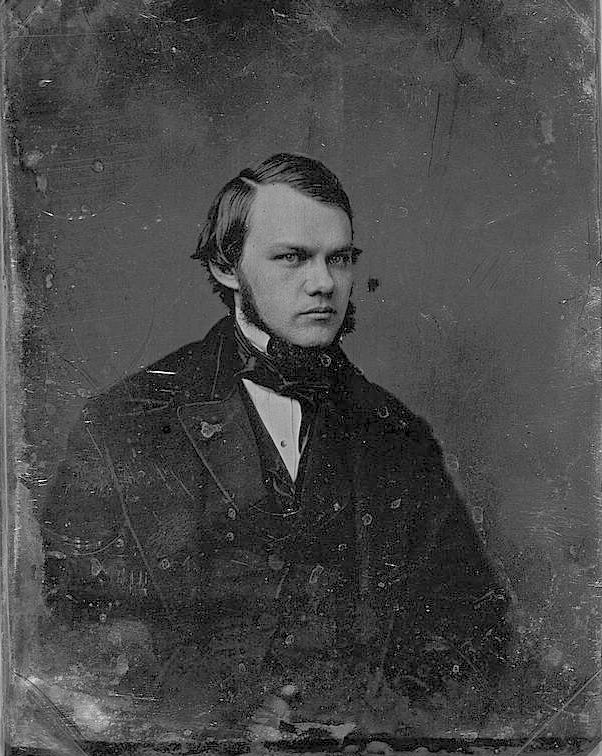- Henry Jarvis Raymond
Infobox_Politician
name = Henry J. Raymond

office = 2nd Chair of theRepublican National Committee
term_start = 1864
term_end = 1866
predecessor =Edwin D. Morgan
successor =Marcus L. Ward
birth_date = birth date|1820|1|24|mf=y
birth_place = Livingston County,New York
death_date = death date and age|1869|6|18|1820|1|24|mf=y
death_place =New York City ,New York Henry Jarvis Raymond (January 24 1820 near Lima,
Livingston County, New York - June 18 1869New York City ) was an American journalist and politician.Life
He graduated from the
University of Vermont in 1840. After assistingHorace Greeley in publishing several newspapers, Raymond formed Raymond, Jones & Co. in 1851, and founded theNew York Times . He was the newspaper's editor and chief proprietor until his death inNew York City .New York State politics
Raymond was a member of the
New York State Assembly in 1850 and 1851, and in the latter year was its speaker. A member of the Whig party's Northern radical anti-slavery wing, his nomination over Greeley on the Whig ticket forLieutenant Governor of New York in 1854 led to the dissolution of the political firm of Seward, Weed and Greeley. Raymond was elected lieutenant governor, and served from 1855 to 1856.Raymond had a prominent part in the formation of the Republican Party and drafted the Address to the People adopted by the Republican organizing convention which met in Pittsburgh on February 22 1856. In 1862, he was again Speaker of the New York Assembly.
National politics
During the Civil War, Raymond supported Lincoln's policies in general, but protested his delays in aggressively prosecuting the war.Fact|date=February 2007 He was among the first to urge the adoption of a broad and liberal post-war attitude toward the people of the South and opposed the Radical Republicans who wanted harsher measures against the South. In 1865, he was a delegate to the National Republican Convention, and was made Chairman of the
Republican National Committee . He was a member of the House of Representatives from 1865 to 1867.On December 22 1865, he attacked
Thaddeus Stevens 's theory of the dead states (in which states that had seceded were not to be restored to their former status in the Union), and, agreeing with the President, argued that the states were never out of the Union, in as much as the ordinances of secession were null. Raymond authored the Address and Declaration of Principles issued by the Loyalist Convention (orNational Union Convention ) atPhiladelphia in August 1866. His attack on Stevens and his prominence at the Loyalist Convention caused him to lose favor with the Republican party. He was removed from the chairmanship of the Republican National Committee in 1866, and in 1867 his nomination as minister toAustria , which he had already refused, was rejected by theUnited States Senate .He retired from public life in 1867 and devoted his time to newspaper work until his death in New York City in 1869.
Journalistic career
Raymond began his journalistic career on Greeley's "Tribune" and gained further experience in editing James Watson Webb's "Courier and Enquirer." Then, with the help of friends, Raymond raised one hundred thousand dollars capital (a hundred times what Greeley staked on the "Tribune" ten years earlier) and founded the "New York Times" on September 18 1851.
Editorially, Raymond sought a niche between Greeley's open partisanship and Bennett's party-neutrality. In the first issue of the "Times" Raymond announced his purpose to write in temperate and measured language and to get into a passion as rarely as possible. "There are few things in this world which it is worth while to get angry about; and they are just the things anger will not improve." In controversy he meant to avoid abusive language. His editorials were generally cautious, impersonal, and finished in form.
Works
Raymond was an able public speaker; one of his best known speeches was a greeting to Hungarian leader
Lajos Kossuth , whose cause he defended.Fact|date=August 2008In addition to his work with the "New York Times", he wrote several books, including:
* "A Life of Daniel Webster" (1853)
* "Political Lessons of the Revolution" (1854)
* "A History of the Administration of President Lincoln" (1864)
* "The Life and Public Services of Abraham Lincoln" (1865)Publications
* Augustus Maverick, "Henry J. Raymond and the New York Press for Thirty Years" (Hartford, 1870)
References
* [http://www.questia.com/PM.qst?a=o&d=9199060 Davis, Elmer. "History of the New York Times, 1851-1921" (1921)]
* Dicken-Garcia, Hazel. "Journalistic Standards in Nineteenth-Century America" (1989)
* [http://www.questia.com/PM.qst?a=o&d=15305157 Douglas, George H. "The Golden Age of the Newspaper" (1999)]
* [http://www.questia.com/PM.qst?a=o&d=107069643 Sloan, W. David and James D. Startt. "The Gilded Age Press, 1865-1900" (2003)]
* [http://www.questia.com/PM.qst?a=o&d=49503287 Summers, Mark Wahlgren."The Press Gang: Newspapers and Politics, 1865-1878" (1994)]
*
* This article also copies from [http://www.bartleby.com/226/index.html#12 Newspapers, 1775 – 1860 by Frank W. Scott] (1917), which is also in the [http://www.bromsun.com/practices/copyright-portfolio-development/flowchart.htm public domain]External links
* [http://www.mrlincolnandnewyork.org/inside.asp?ID=38&subjectID=3 Mr. Lincoln and New York: Henry J. Raymond]
*
Wikimedia Foundation. 2010.
